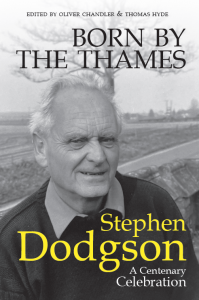 One of the most memorable occasions of my singing career was taking part in the first performance – and several subsequent ones – of Stephen Dodgson’s Te Deum with Exhortations from the Martyrs, written in 1972 for Denys Darlow, for whom at the time I sang a good deal in his various ensembles. It was a most exciting work, with an almost visceral impact, being scored for ‘baroque’ orchestra, such as would already have been on the platform for works by Bach and his contemporaries which Darlow favoured. (Indeed, Denys made a habit of this, commissioning much music from the likes of Edmund Rubbra, Adrian Cruft, Bernard Stevens, Bryan Kelly, Geoffrey Burgon and Christopher Brown.) I was sufficiently haunted by the work that I had to go to Chappell’s to borrow the full score, which I think rather amused Stephen, who some years later, after bumping into me unexpectedly in Kew Gardens, gave me a copy of the full score and one of the Magnificat he subsequently wrote for Denys and off-air recordings of the first broadcast performances, in both of which I had sung. These performances were also memorable for the contributions of the soloists – Felicity Palmer, Ian Partridge, Christopher Keyte, Hazel Holt, John Elwes and David Thomas – and, in the Te Deum, the virtuoso timpanist, Robert Howes.
One of the most memorable occasions of my singing career was taking part in the first performance – and several subsequent ones – of Stephen Dodgson’s Te Deum with Exhortations from the Martyrs, written in 1972 for Denys Darlow, for whom at the time I sang a good deal in his various ensembles. It was a most exciting work, with an almost visceral impact, being scored for ‘baroque’ orchestra, such as would already have been on the platform for works by Bach and his contemporaries which Darlow favoured. (Indeed, Denys made a habit of this, commissioning much music from the likes of Edmund Rubbra, Adrian Cruft, Bernard Stevens, Bryan Kelly, Geoffrey Burgon and Christopher Brown.) I was sufficiently haunted by the work that I had to go to Chappell’s to borrow the full score, which I think rather amused Stephen, who some years later, after bumping into me unexpectedly in Kew Gardens, gave me a copy of the full score and one of the Magnificat he subsequently wrote for Denys and off-air recordings of the first broadcast performances, in both of which I had sung. These performances were also memorable for the contributions of the soloists – Felicity Palmer, Ian Partridge, Christopher Keyte, Hazel Holt, John Elwes and David Thomas – and, in the Te Deum, the virtuoso timpanist, Robert Howes.
What strikes one of Dodgson the man, and of his music, is his humanity and integrity, and this shines from the collection of tributes gathered together in this volume to celebrate the composer’s centenary: after an Introduction there are three parts – Part I, ‘The Composer’s Voice’; Part II, ‘Memories ad Tributes’; Part III, ‘Perspectives on Stephen Dodgson’s Work.’
Part I reproduces the scripts of four talks of an autobiographical nature, commenting on his experience as a composer, getting ideas, writing in particular forms – and a piece about ‘The Harp (and Harpists) in my Life’ – and in all of these that congenial voice, so familiar from BBC Record Review on Radio Three from the late 1950s until 1990, can clearly be heard.
Part II has memories and tributes from friends and colleagues, some of them in the form of interviews, including Dodgson’s wife, the harpsichordist Jane Clark; Part III examines various genres and individual works, and is absolutely fascinating, even (or perhaps especially) in areas of limited interest to the reader: Lance Bosman’s chapter on the guitar works to my surprise I found utterly absorbing.
Stephen Dodgson has a reputation for writing works for guitar: ‘The difficulty of composing for it … is a challenge … that appeals to me’ (p. 117); but the range of his composition is wide, as indicated by the list of works included in this volume (and a discography). Another standout moment for me was the revival of the opera Margaret Catchpole as Snape in 2019. But Dodgson deserves to be better known, and for a wider variety of works. Perhaps his centenary, and this nicely-produced paperback (with photographs and musical illustrations) will go some way to remedying the neglect. At any rate, it’s an absorbing and important book, which deserves to be widely read – and is a hugely enjoyable read!
Garry Humphreys
Fanfare





